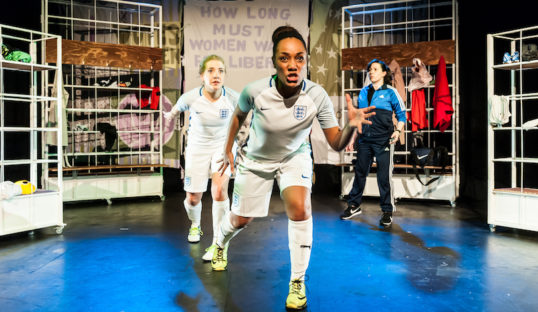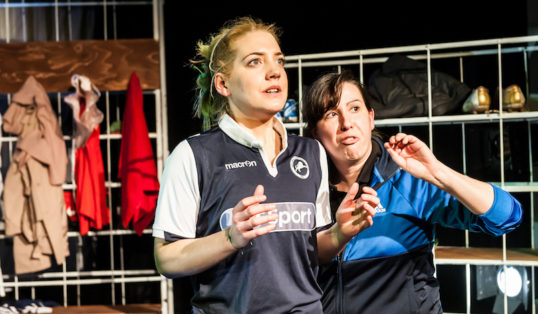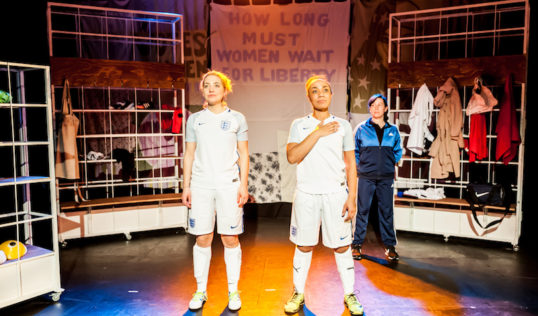Offside
★★★★☆ Inspiring
Traverse Theatre: Thurs 30 Mar – Sat 1 Apr 2017
Review by Hugh Simpson
Offside, Futures Theatre’s touring production at the Traverse, is a heartfelt, energetic and ultimately uplifting play about women’s football that explores wider issues with humour and intelligence.
Anyone with experience of football administration will know that the game is very much run by old white men in suits. You do not have to go far to come across positions that range from inertia, through the fear of losing of position that widening the game’s power base would entail, all the way to bigotry, sexism and homophobia – attitudes still all too prevalent in crowds at the men’s game.
The 1920s ban on women playing on FA-affiliated pitches that effectively prevented the women’s game from growing for the next 50 years undoubtedly came from prejudice, but also from a worry that the huge numbers attending women’s matches would have a negative impact on the men’s game.
That ban forms a crucial part of a play by Sabrina Mahfouz and Hollie McNish that places the struggles facing women footballers in a wider context. While it comes at the subject from a largely English perspective – the main storyline features Mickey and Keeley, two England national side hopefuls – the issues described are even more relevant in Scotland.
Here, the FA ban lasted slightly longer – until 1974. The national team have been considerably more successful than their male counterparts in recent years, but you will still struggle to find too much about them in the mainstream media. In Kim Little, Scotland have a genuinely world-class player, but one who is far less recognised than any number of undistinguished male players.
So the issues explored here are vital ones, and they are approached with passion and intelligence, if unevenly at times. Attempts to put things in historical context by spotlighting pioneering players such as Lily Parr, are wittily and economically done.
trailblazers
The story of Carrie Boustead, a black player from the 1880s, is an interesting one – not least because recent research suggests Boustead was white, and that Emma Clarke was the player mentioned in contemporary reports. Rather than undermining the story, however, this is entirely appropriate, as it shows how little attention has been paid to such trailblazers – and this play is at least bringing stories like this into the open.
Tanya-Loretta Dee and Jessica Butcher play the modern players and their historic counterparts, with Daphne Kouma taking on a number of supporting roles. All three have a tremendous presence, and there is a suitable physicality about the performance without it going over the top.
The play’s originator and director Caroline Bryant has a fine understanding of how to use the acting area, and the performers are very much aware of the audience without it becoming cheesy. In true football style, they go out first to own the space and earn the right to play.
If there are some slip-ups – the odd dodgy accent, a closing montage of projections that is not easy to see against the slightly over-fussy caged changing-room set – well, Brian, nobody’s perfect.
Unfortunately, one of the main faults lies with some of the actual representation of football. Reality-stretching conversations during a game, and the players’ awareness of individual crowd members, have always been features of football fiction; unfortunately, so have misplaced jargon and descriptions of incidents that do not ring true. Live sport on stage so very rarely works.
defiantly and rawly poetic
When it moves further from simple descriptions of a game, it becomes stronger. With McNish best known as a poet – she has just won the Ted Hughes poetry award – it is not surprising that the script is defiantly and rawly poetic; the backstories and motivations of the two modern players are effectively and emotionally done.
These stories touch on racism and LGBT issues as well as gender stereotyping; while it is understandable that Lily Parr’s status as an LGBT icon is underplayed, it is important that such questions are addressed. The England women’s team has, after all, had an openly gay captain, while apparently every male professional in the UK is straight – a statistical impossibility that is easier to understand when you look at what has happened in the past.
This inclusive attitude is a definite plus, and is reflected in the piece’s structure. What may appear to be a melange of styles, mixing times, places, and methods of expression, actually turns out to be a strength. The moves between styles are best when they just happen; the introduction of the historic sections is awkwardly artificial and places too little belief in the audience’s ability to work out what is going on.
Football is after all a broad church, with many different people attracted to it for disparate reasons; those of us who love it but despair at the prehistoric attitudes some bring, can take heart from the fact that not everyone agrees with the most aggressive, shoutiest acolytes.
a part of life
And, of course, representing the experiences of so many different women without stereotyping requires a somewhat scattergun approach. What they have in common is a desire to carve out their own niche, and be judged on their achievements, not by the standards of tired prejudice.
Too many artistic works about sport fail because they try to treat it as a metaphor for life. Football isn’t a metaphor, it’s a part of life – and for many people, a huge part. Fortunately, you don’t hear that ‘politics should be kept out of sport’ these days; it tended to be trotted out by cricket writers with a vested interest in propping up apartheid in South Africa, and was rarely said by a member of an oppressed minority.
The overt consciousness-raising is entirely appropriate, therefore, in a piece that celebrates past victories, rights yet to be won, and stories that demand to be heard.
Running time 1 hour 5 minutes (no interval)
Traverse Theatre, 10 Cambridge Street, EH1 2ED
Thursday 30 March – Saturday 1 April 2017
Evenings at 8.00 pm
Information and tickets: https://www.traverse.co.uk/whats-on/event-detail/1135/offside.aspx
If you can’t get to one of the theatres listed below to see the play, you can always buy the script. Click on the cover below to purchase through Amazon.
| Offside on tour 2017: | |||
|---|---|---|---|
| 30 March – 1 April | Edinburgh Traverse |
0131 228 1404 | Book online |
| Thurs 6 April | Havant Spring Arts and Heritage Centre |
023 9247 2700 | Book online |
| Fri 7/Sat 8 April | Bristol Wardrobe theatre |
0117 902 0344 | Book online |
| Tue 11 April | Canterbury Marlowe |
01227 787787 | Book online |
| Thurs 13 April | Doncaster Cast |
01302 303 959 | Book online |
| Weds 19 April | Southend Clifftown Theatre & Studios |
01702 328335 | Book online |
| Thurs 20 April | Oxford The North Wall |
01865 319450 | Book online |
| Fri 21/Sat 22 April | Manchester Contact |
0161 274 0600 | Book online |
| Mon 24 April | Cambridge Cambridge Junction |
01223 511 511 | Book online |
| Thurs 27 – Sat 29 April | Newcastle Northern Stage |
0191 230 5151 | Book online |





















